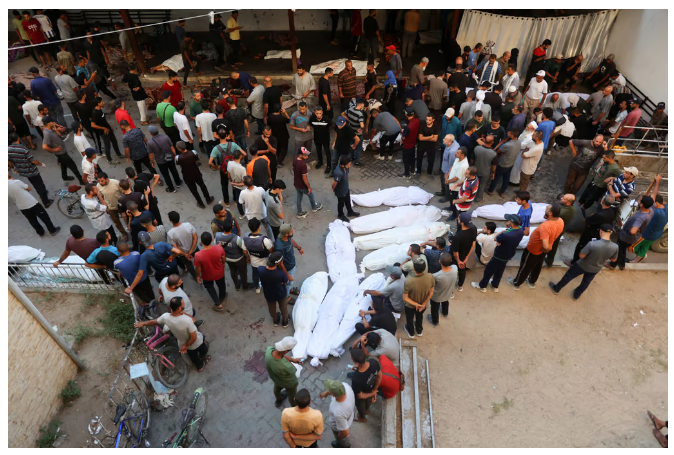In Gaza and other conflict zones, relentless Scholasticide is threatening to upend key international legal principles.
Scholasticide cannot be normalized
Attacks on schools in Gaza, among others, have been relentless and border on the dismantling of basic principles of international law.

The attack in Gaza City’s Daraj neighborhood came during dawn prayers at the school, and the deaths were mostly women and children. | Omar Al-Qattaa/AFP via Getty Images
The same bombarded Al-Tabin School on August 10 in Gaza City killed over 100 people sheltering there, many of them children.
According to the United Nations, it was one of 17 deadly attacks in the strip last month alone on schools, an agency run by UNRWA.
Spaces of learning have just been converted into shelters for the displaced and turned into repeated targets in this war where demarcation lines between combatants and civilians have been completely blurred.
The tens of thousands of children this week should be celebrating the start of a new school year, but they are instead living through a nightmare: scholasticide – a word coined specifically to describe the obliteration of education in Gaza.
Scholasticide has become a Global Crisis
Dr Karma Nabulsi of Oxford University actually coined the term during the Israeli assault on Gaza in 2008-09, when schools, the Ministry of Education and other buildings relating to learning were targeted.
The devastation wrought today upon the education system in Gaza is unimaginable: thousands of students and hundreds of teachers have been killed and hundreds of schools damaged or destroyed over the past 11 months.
This intentional undermining of the educational system in Gaza risks not only the future of hundreds of thousands of Palestinian children but also the international humanitarian regime and our collective moral compass.
It seems to me that global society is gradually normalizing the unthinkable.
The normalization of violence against schools points to a deeper crisis in our global values, where protection of the innocent is no longer guaranteed and the very fiber of our humanity unravels.
Also Read: Museum to Part With Cranach Portrait That Was Sold to Flee the Nazis
The Geneva Conventions and their Additional Protocols clearly state that such attacks on schools are prohibited – and yet they have continued.
Based on data collected by UNICEF, as of July 6, there were 318 schools in the Gaza Strip directly targeted. Dozens more have taken place since then.
Whether the strike on al-Tabin School on August 10 was legally justified or not, given that Hamas fighters may or may not have been operating there, is together a discussion that misses the point: schools are for learning; such military actions are an assault on mere civilian, in particular children’s, rights.
Teachers struggle to educate Gaza’s children with many schools reduced to rubble
Beyond the obvious and unnecessary harm to children and youth, attacks on schools inevitably further escalate tensions, undermining efforts to reach a just and lasting resolution.
Education is a right included in the Universal Declaration of Human Rights; it is a right in war, under the provisions of the Fourth Geneva Convention.
How would this right be provided for Palestinian children if schools were to be reduced to crumbling walls and craters?
Regrettably, the attack on learning has not been restricted to only Gaza. According to UNICEF, this war in Ukraine, which escalated in February 2022, has seen damage or the destruction of over 1,300 education facilities.
How to Find Your Local Pincode?
According to the Global Coalition to Protect Education from Attack, incidents targeting education and the military use of schools increased nearly 20 percent in 2022 and 2023 compared with the previous two years.
The international community’s ability to implement protection as required under international humanitarian law-in particular, the Geneva Conventions-is demonstrably on the wane.
These laws, inked by over 190 countries, call on the protection of civilians, including children, during armed conflict, and for violators to be prosecuted.
These pledges, however, have done nothing to safeguard the children of Gaza, as they have many other places of conflict.
Appeals for action-as highly necessary as urgent and concrete ones, such as immediate cease-fire and humanitarian intervention-do not absolve anyone from taking responsible and effective action in order to give meaning to the principles of international law.
How To Grow A Complete Natural Pharmacy In Your Backyard?
By allowing the international community to tolerate these breaches of international law for months and years, it normalizes its erosion.
This gradual acceptance emboldens global norms that make once unthinkable actions appear to be tolerable.
At the point where attacks on schools are increasingly tolerated, a fundamental betrayal of the core principles of the international legal regime and civilian protections has occurred.
The choices before us are stark, indeed: We can act decisively to defend the principles of humanitarian law and protect the innocent, or we allow a gradual undermining of our common values.
The world cannot afford indifference; for the cost of inaction is counted in the lives and futures of children.
